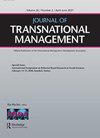Human capital and crisis management
引用次数: 12
Abstract
ABSTRACT Increasing accidents and dangerous events occurring at organizational and national levels have made it imperative that proper structural and cultural arrangements are established. One of the most effective approaches is crisis management (CM). Although CM is generally considered a recent rather than a customary approach, it is in the West that it has gained prominence and resources are allocated for effective performance. This study is designed to address CM and talent in the Arab World. The article draws on recent developments in a variety of fields, especially sociology, management, and international relations. More important, the article makes a strong argument that CM is doomed to failure without adequate training, learning, and development of human capital. For this very reason, the article outlines certain strategies to enhance effective coping with crises and better execution of CM. These strategies do not focus solely on the individual but also on the organization and its culture. The study develops a classification of Arab organizations in terms of their readiness to risk management.人力资本与危机管理
在组织和国家层面发生的事故和危险事件越来越多,因此必须建立适当的结构和文化安排。最有效的方法之一是危机管理(CM)。虽然管理通常被认为是最近才出现的,而不是一种习惯的方法,但在西方,它已经获得了突出地位,并为有效的绩效分配了资源。本研究旨在解决阿拉伯世界的CM和人才问题。这篇文章借鉴了各个领域的最新发展,特别是社会学、管理学和国际关系。更重要的是,这篇文章提出了一个强有力的论点,即如果没有充分的培训、学习和人力资本的发展,人力资本管理注定要失败。出于这个原因,本文概述了提高有效应对危机和更好地执行CM的某些策略。这些策略不仅关注个人,也关注组织及其文化。这项研究根据风险管理的准备程度对阿拉伯组织进行了分类。
本文章由计算机程序翻译,如有差异,请以英文原文为准。
求助全文
约1分钟内获得全文
求助全文
来源期刊

Journal of Transnational Management
Social Sciences-Development
CiteScore
2.30
自引率
0.00%
发文量
10
期刊介绍:
As the economic marketplace expands across continents and cultures, it is essential to establish a world-wide network of ideas and information that serves your transnational business interests. The Journal of Transnational Management (retitled from the Journal of Transnational Management Development to better reflect its focus) is an international forum that examines management research, teaching and training techniques, consulting, and development issues from a multicultural perspective, presenting practical business strategies that produce results on a global scale. The Journal of Transnational Management is a comprehensive resource for management in foreign environments, presenting an exchange of conceptual and empirical research on an international level. Articles written by business practitioners, management development experts, and academicians address issues related to firms, public enterprises, educational institutions, and nonprofit organizations throughout the world.
 求助内容:
求助内容: 应助结果提醒方式:
应助结果提醒方式:


